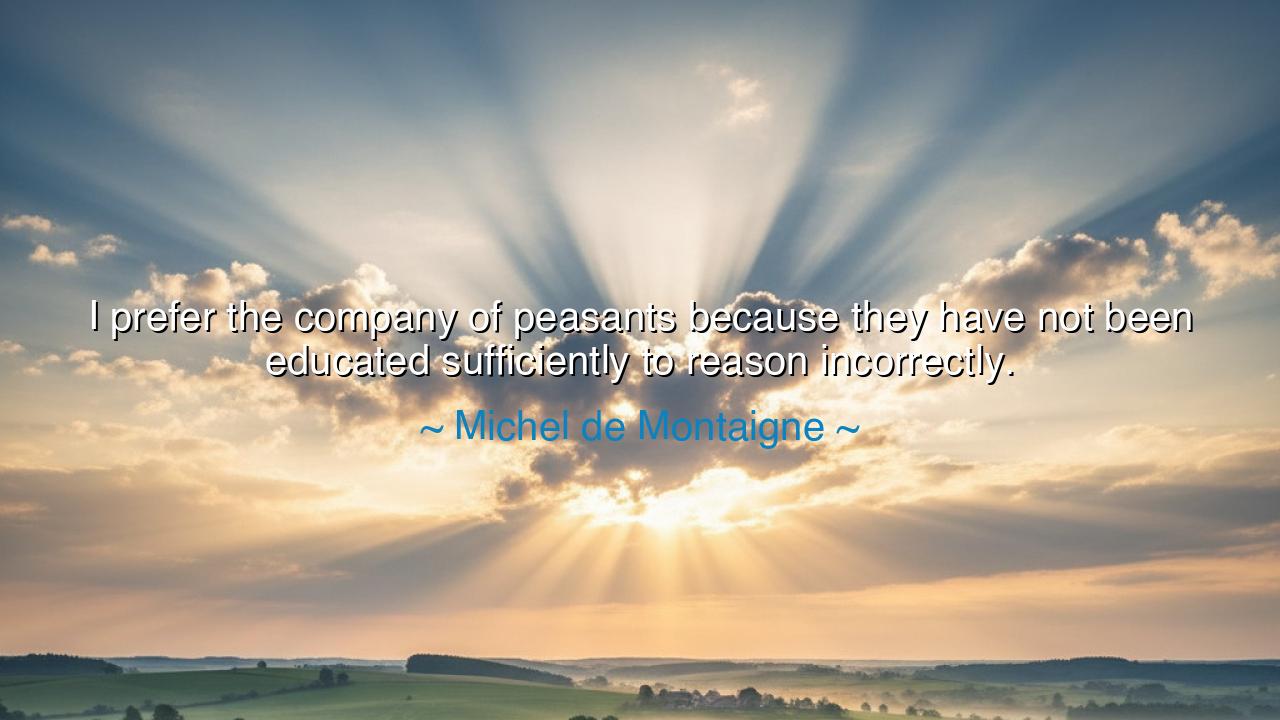
I prefer the company of peasants because they have not been
I prefer the company of peasants because they have not been educated sufficiently to reason incorrectly.






In the wry and timeless words of Michel de Montaigne, the great French philosopher and father of the modern essay, there rings a paradox both sharp and profound: “I prefer the company of peasants because they have not been educated sufficiently to reason incorrectly.” What appears at first as irony conceals a deep insight into the nature of wisdom, education, and truth. Montaigne, a man who walked among scholars and statesmen, saw that learning, when not joined with humility and honesty, can twist the mind instead of enlightening it. The peasant, though unlearned, still possesses something the scholar often loses — the directness of perception, the simplicity of heart, and the ability to see life as it is, unclouded by vanity or sophistry.
The origin of this saying lies in Montaigne’s lifelong meditation on human folly. Living in sixteenth-century France — an age of war, religion, and intellectual pride — he witnessed how the so-called “learned” could use their knowledge to justify cruelty, ambition, and superstition. As a man devoted to understanding himself and others, Montaigne came to see that education, though noble in purpose, often leads astray those who mistake cleverness for truth. His essays are filled with reflections on how reason, untempered by experience or virtue, becomes a servant to error. Thus, he spoke these words not to glorify ignorance, but to expose the danger of false reasoning — of minds that have learned too much, and understood too little.
To reason incorrectly, as Montaigne describes, is the peculiar disease of the educated — for only those who possess the tools of logic can misuse them. The simple man, guided by instinct and necessity, lives closer to nature’s truth. He plants when the soil calls, rests when the body tires, and believes what his eyes have seen. The scholar, however, too often replaces reality with theory, wisdom with argument. He debates what the peasant knows by living. Thus, the philosopher’s insight is not a rejection of learning but a defense of clarity — a reminder that true education is not the piling of words, but the cultivation of judgment.
History offers many examples of this truth. Consider the tale of Diogenes, the Cynic philosopher of ancient Greece, who lived in poverty but spoke with a clarity that shamed the learned men of Athens. When Plato defined man as a “featherless biped,” Diogenes plucked a chicken, brought it to the philosopher’s academy, and declared, “Here is Plato’s man!” His wit cut through the fog of intellect to reveal the simple reality hidden beneath abstraction. Like Montaigne’s peasants, Diogenes showed that wisdom often dwells not in ornate learning, but in seeing plainly, without the pretense of brilliance. The uneducated may err in ignorance, but the educated often err with confidence — and that, Montaigne suggests, is the more dangerous of the two.
There is in Montaigne’s words a call to humility — the recognition that knowledge must serve truth, not pride. The peasant, though lacking in letters, often surpasses the scholar in wisdom because he has not yet learned how to deceive himself. His thoughts are few, but they are honest; his judgments simple, but sincere. The educated man, conversely, may weave a thousand arguments to defend a falsehood, disguising confusion as insight. Montaigne warns us that the more finely reason is trained, the more cunningly it can err. The mind, like a sharp blade, can heal or harm — and without virtue to guide it, it turns inward, wounding its own master.
This is not a call to reject education, but to purify it. For Montaigne was himself deeply learned, yet humble enough to laugh at his own ignorance. He believed that wisdom begins where arrogance ends. The truly educated person, he said, is not the one who knows the most, but the one who knows he does not know. The peasant, living in harmony with his limitations, embodies this truth. His ignorance protects him from the illusions of certainty. In his simplicity, there is a kind of enlightenment — a stillness that the scholar, forever restless in his intellect, seldom finds.
The lesson, then, is clear and enduring: seek knowledge, but do not let it corrupt your sight. Let your learning serve the heart as much as the mind. Study the world, but never believe you have mastered it. Speak with those who know less, for their simplicity may restore your sanity. Do not reason merely to win arguments; reason to discover truth — and when truth escapes you, have the humility to admit it. For education that leads away from wisdom is not education at all, but vanity dressed in the robes of intellect.
So, my listener, remember the wise humor of Michel de Montaigne. Do not be so learned that you forget how to see. Honor the peasants of your own life — those who speak plainly, who work honestly, who trust their eyes and hearts more than their tongues. For they, unburdened by the pride of cleverness, live closer to the essence of wisdom than the philosopher lost in words. The mind that learns without humility will reason itself into folly; but the soul that stays simple, honest, and aware will see truth where scholars quarrel and sages fall silent.






AAdministratorAdministrator
Welcome, honored guests. Please leave a comment, we will respond soon